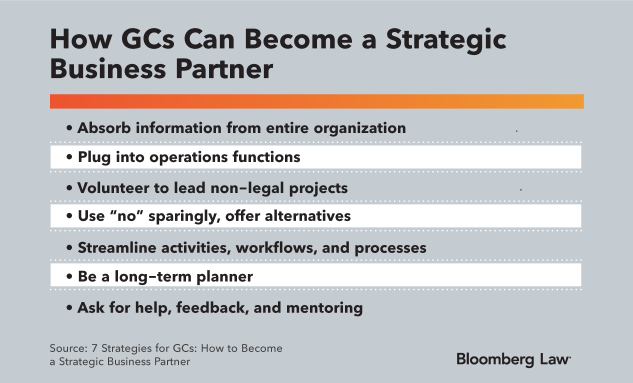How GCs can evolve from ‘lawyer in the room’ to strategic business partner
This article originally appeared on Bloomberg Law.
Modern general counsel need to partner with the CEO and advise on more than just legal matters. Nathan Wenzel, founder of SimpleLegal, says GCs are expected to be strategic business partners, analysts, and budget managers, and offers tips on how to achieve these goals.
It is no longer sufficient for general counsel to simply focus on the law. The role of the modern GC expands beyond the legal realm, now including a business view looking cross-functionally across the organization.
In addition to providing the legal advice that allows the company to navigate regulatory and legal challenges, the modern GC is also a strategic business partner, business analyst, and budget manager.
GCs who want to continue to expand their career will evolve to make these significant contributions to their companies that go beyond standard legal fare.
Adopt a ‘Business First, Legal Second’ Way of Thinking
Modern GCs should be strategic and take action that gets noticed by the company’s leadership. Increasingly, leadership want GCs who approach business problems with a business mindset, rather than only the legal mindset, working as a partner with the CEO to solve complex business problems.
This shift is great news for lawyers who commonly excel in communication, problem-solving, and logical thinking. Lawyers also typically bring years of experience simplifying complex information. Together, these skills translate into areas beyond legal, whether that’s M&A, finance, sales, product development, or marketing—it’s all about deconstructing complex problems and finding a solution.
Use Technology to Collect Data
Every other department leader has a defined technology stack to provide a quantitative view of their world. GCs now have the technology to collect data allowing them to speak quantitatively about their department and measure productivity through lenses such as total legal costs, cost by matter or practice area, internal vs. external spend, etc.
This quantitative approach allows GCs to fit in with their C-suite colleagues and proactively propose business process improvements—emerging as a key member of the leadership team. GCs are even using legal technology to align and integrate with core business processes, ensuring closer collaboration with other key departments such as finance.
The adoption of a legal technology stack is just as critical for the GC as the marketing technology stack is for the Chief Marketing Officer.
Demonstrate ROI to Change Misconceptions
GCs are no longer immune to the financial pressures faced by other departments. It is necessary to have a complete understanding of the business objectives with control over department spend, budget, and staffing to help achieve those objectives.
The most critical information for a GC to have on hand is line-by-line awareness of where their department is spending money. By demonstrating that every dollar has a traceable return on investment, whether that’s through mitigating important risks to the company or actually driving revenue through contract management, a GC will be able to overcome the misconception that legal is just a cost center.
Armed with this data, GCs have an opportunity to differentiate their department from traditional stereotypes and lead in areas once out of reach for the legal team.
Build Relationships Across Levels, Departments
Being a strategic leader means having a working understanding of all elements of the business. The best way to gain that understanding is to work alongside and learn from others. Ask questions, take leadership roles in cross-functional projects, and elicit feedback from outside the department.
Seeking feedback is also one of the most impactful ways to develop relationships across the organization—your teammates outside of legal will be surprised at first, but ultimately excited to partner with you.
An excellent way to engage other departments is with regular meetings with your CEO and board members. Define the content that they need to see. People outside of legal won’t always know which questions to ask. Forget the boundaries that came with your job description in favor of an “if there is a way I can help the company, I’m going to raise my hand” mindset.
By looking beyond their own departments, GCs gain a clearer view of how legal can contribute toward achieving overall business objectives.
GCs that are engaged, making strategic use of technology, watching the bottom line, and communicating across the organization are exactly what today’s market demands.

This column does not necessarily reflect the opinion of The Bureau of National Affairs, Inc. or its owners.
Author Information
Nathan Wenzel is the founder of SimpleLegal, which provides a modern legal operations management platform that streamlines the way corporate legal departments manage their matters, track and interpret spend, and collaborate with vendors and law firms.
Stephan Eberle, general counsel at Scale Venture Partners and Wenzel are co-authors of a white paper, 7 Strategies for GCs: How to Become a Strategic Business Partner.

